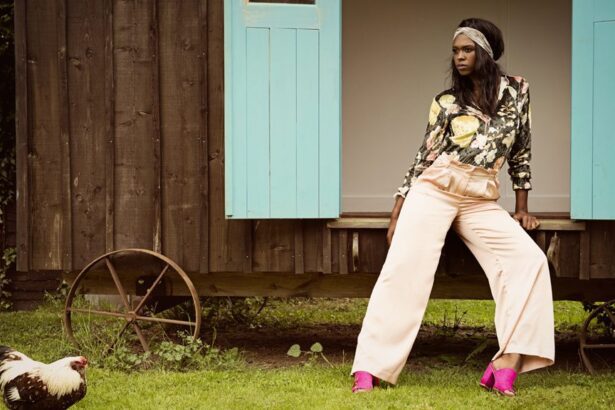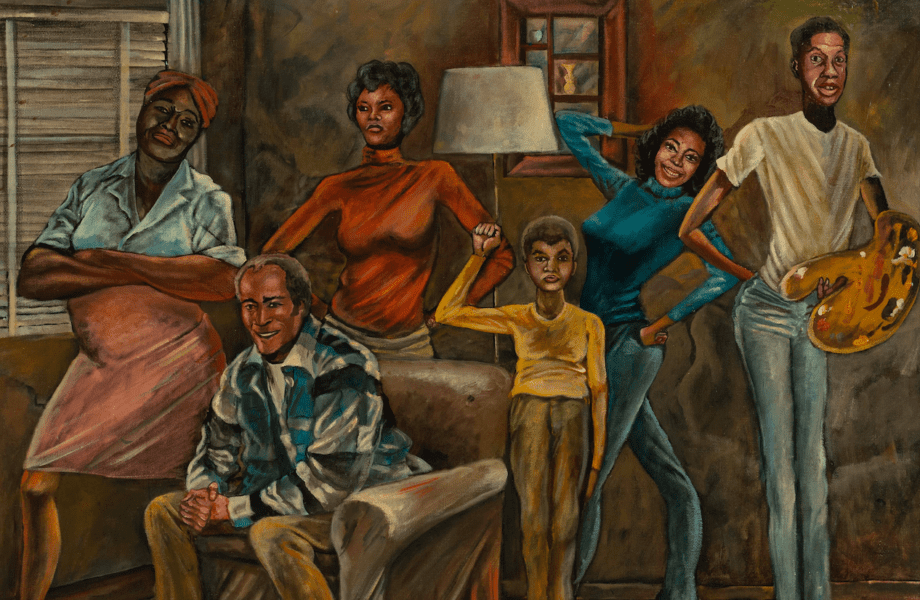ERNIE BARNES, “Evans Family Portrait,” 1974 (acrylic on canvas, 24 x 30 inches / 61 x 76.2 cm). | Courtesy the Ernie Barnes Estate, Ortuzar Projects and Andrew Kreps Gallery. © Ernie Barnes
THE FIRST EXHIBITION of Ernie Barnes (1938-2009) at Ortuzar Projects in New York surveys the late artist’s key themes, including the finesse, tenacity, and grit of sport; symbolic Southern scenes; and the 1970s sitcom “Good Times.”
Barnes is the rare artist who found fame on television. His best known painting is “The Sugar Shack” (1976), a sensual dance hall scene featured during credits of “Good Times.” (Barnes also made the paintings attributed to the character JJ Evans on the show.)
“The Sugar Shack” has gained renewed appreciation having been shown in several exhibitions in recent years and setting an astronomical new record at auction when it sold for $15.3 million in 2022. The stunning result was exponentially more than the estimate ($150,000-$200,000), far surpassed the artist’s previous record of $550,000, and brought Barnes wider art world attention and international news coverage.
This exhibition doesn’t include “The Sugar Shack,” but it offers a rare opportunity to view two other paintings featured on “Good Times”: an Evans family portrait and a “self portrait” of JJ.
Ernie Barnes depicted the contours of African American life in the segregated South and the beauty of bodies in motion on the the athletic field and the dance floor.
ERNIE BARNES, “Stickman,” 1971 (acrylic on canvas, 30 x 40 inches / 76.2 x 101.6 cm). | Courtesy the Ernie Barnes Estate, Ortuzar Projects and Andrew Kreps Gallery. © Ernie Barnes
BARNES WAS A MASTER STORYTELLER whose narrative paintings reflect his varied experiences. The artist grew up in segregated Durham, N.C., and played college and pro football before dedicating himself to a career in art, based in Los Angeles, Calif. Barnes depicted the contours of African American life in the South and the beauty of bodies in motion on the the athletic field and the dance floor. His paintings are defined by a lively sense of action and the dignity and joy found in the rituals of quotidian life.
Presented in collaboration with Andrew Kreps Gallery, “Ernie Barnes: In Rapture” features paintings of pool players, football players, and basketball players. The exhibition showcases treasured Barnes images, including “The Graduate” (1972), capturing his subject mid stride wearing a black cap and gown; “Homecoming” (1994), which pictures a marching band parading down the street; and “Room Ful’A Sistahs” (1994), a lively gathering of women in a living room scene.
Music is another frequent theme that threads the artist’s oeuvre. Several works on view reference music, including “Street Song” (1971), “The Maestro” (1983), and “Full Boogie” (1978). A crowded dance scene in a building with rustic wood floors and wood rafters, “Full Boogie” bears a striking resemblance in terms of look, feel, and composition to “The Sugar Shack.”
The exhibition is titled after “In Rapture” (2000), one of the paintings on view whose female subject could have been plucked from “The Sugar Shack” or “Full Boogie.” Wearing a silky, golden yellow dress, she is dancing solo, deeply consumed by the soulful, transfixing rhythms of a tune the viewer can only imagine. The sultry image is rife with passion and energy. The strap of her dress has fallen off of her shoulder and she’s kicked off one of her high-heeled shoes. A portrait of unbridled abandon, the painting is a nexus of some of Barnes’s most beloved touchstones: Black women, music, and motion.
“Ernie Barnes: In Rapture” presents about 20 paintings produced across four decades, from 1966 to 2004. Several works on loan are displayed alongside those for sale, the gallery said. CT
“Ernie Barnes: In Rapture” is on view at Ortuzar Projects in New York, N.Y., presented in collaboration with Andrew Kreps Gallery, from April 25-June 15, 2024
FIND MORE about Ernie Barnes on the website of the artist’s estate
FIND MORE about Ernie Barnes on Culture Type
Installation view of “Ernie Barnes: In Rapture,” Ortuzar Projects, New York, N.Y., April 25-June 15, 2024. | Photo by Dario Lasagni
ERNIE BARNES, “Juba Dis an Juba Dat,” 1976 (acrylic on canvas, 23 7/8 x 29 7/8 inches (60.6 x 75.9 cm). | Courtesy the Ernie Barnes Estate, Ortuzar Projects and Andrew Kreps Gallery. © Ernie Barnes
April 26, 2024: When “Ernie Barnes: In Rapture” opened at Ortuzar Projects, collector Alvin Hall moderated a discussion at the gallery with Thelma Golden of the Studio Museum in Harlem, New Yorker writer Doreen St. Felix, and artist Paul Pfeiffer. The conversation explored many aspects of the Barnes’s influence and practice, including some of the meaning and history embedded in his paintings. | Video by Ortuzar Projects

ERNIE BARNES, “Fumble in the Line,” 1990 (acrylic on canvas, 48 x 60 inches / 121.9 x 152.4 cm). | Courtesy the Ernie Barnes Estate, Ortuzar Projects and Andrew Kreps Gallery. © Ernie Barnes
Installation view of “Ernie Barnes: In Rapture,” Ortuzar Projects, New York, N.Y., April 25-June 15, 2024. | Photo by Dario Lasagni
ERNIE BARNES, “Portrait of JJ,” 1974 (acrylic on canvas, 27 x 25 inches / 68.6 x 63.5 cm). | Courtesy the Ernie Barnes Estate, Ortuzar Projects and Andrew Kreps Gallery. © Ernie Barnes
Installation view of “Ernie Barnes: In Rapture,” Ortuzar Projects, New York, N.Y., April 25-June 15, 2024. | Photo by Dario Lasagni
Installation view of “Ernie Barnes: In Rapture,” Ortuzar Projects, New York, N.Y., April 25-June 15, 2024. | Photo by Dario Lasagni
ERNIE BARNES, “Street Song,” 1971 (acrylic on canvas, 25 5/8 x 30 inches / 65.1 x 76.2 cm), in artist’s frame. | Courtesy the Ernie Barnes Estate, Ortuzar Projects and Andrew Kreps Gallery. © Ernie Barnes
Installation view of “Ernie Barnes: In Rapture,” Ortuzar Projects, New York, N.Y., April 25-June 15, 2024. | Photo by Dario Lasagni
Installation view of “Ernie Barnes: In Rapture,” Ortuzar Projects, New York, N.Y., April 25-June 15, 2024. | Photo by Dario Lasagni
ERNIE BARNES, “Protect the Rim,” 1976 (acrylic on canvas, 43 x 25 inches / 109.2 x 63.5 cm), in artist’s frame. | Courtesy the Ernie Barnes Estate, Ortuzar Projects and Andrew Kreps Gallery. © Ernie Barnes
Installation view of “Ernie Barnes: In Rapture,” Ortuzar Projects, New York, N.Y., April 25-June 15, 2024. | Photo by Dario Lasagni
ERNIE BARNES, “Slam Before the Storm,” 1979 (acrylic on canvas, 48 3/8 x 24 5/8 inches .122.9 x 62.5 cm) in artist’s frame. | Courtesy the Ernie Barnes Estate, Ortuzar Projects and Andrew Kreps Gallery. © Ernie Barnes
Installation view of “Ernie Barnes: In Rapture,” Ortuzar Projects, New York, N.Y., April 25-June 15, 2024. | Photo by Dario Lasagni
Installation view of “Ernie Barnes: In Rapture,” Ortuzar Projects, New York, N.Y., April 25-June 15, 2024. | Photo by Dario Lasagni
ERNIE BARNES, “Full Boogie,” 1978 (acrylic on canvas, 36 x 48 inches / 91.4 x 121.9 cm). | Courtesy the Ernie Barnes Estate, Ortuzar Projects and Andrew Kreps Gallery. © Ernie Barnes
Installation view of “Ernie Barnes: In Rapture,” Ortuzar Projects, New York, N.Y., April 25-June 15, 2024. | Photo by Dario Lasagni
BOOKSHELF
“From Pads to Palette” (1995) is an autobiographical volume by Ernie Barnes that chronicles the artist transition from football to art. Two children’s books tell the story of the artist’s life, “Between the Lines: How Ernie Barnes Went from the Football Field to the Art Gallery” and “Pigskins to Paintbrushes: The Story of Football-Playing Artist Ernie Barnes,” written and illustrated by Don Tate.




















